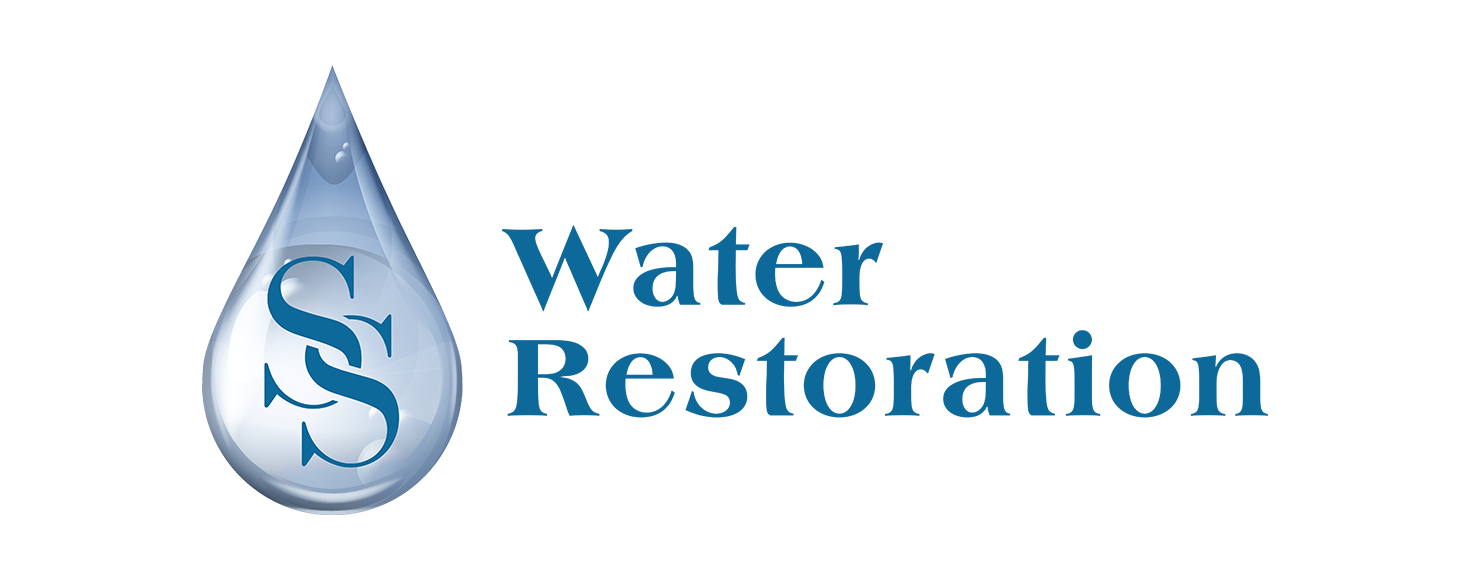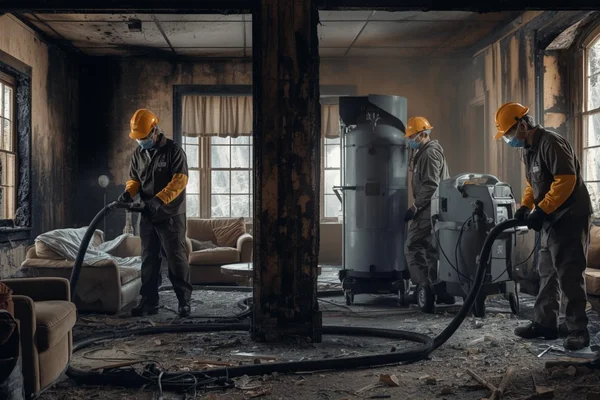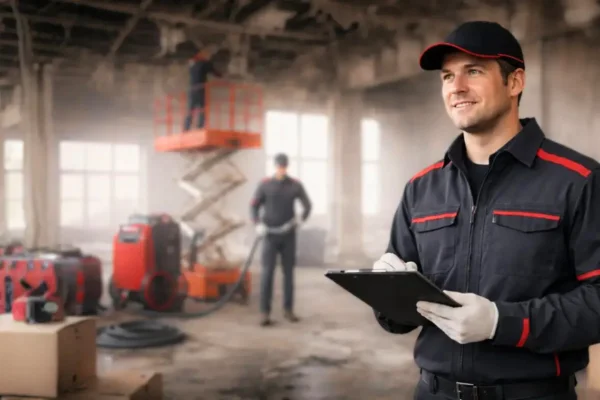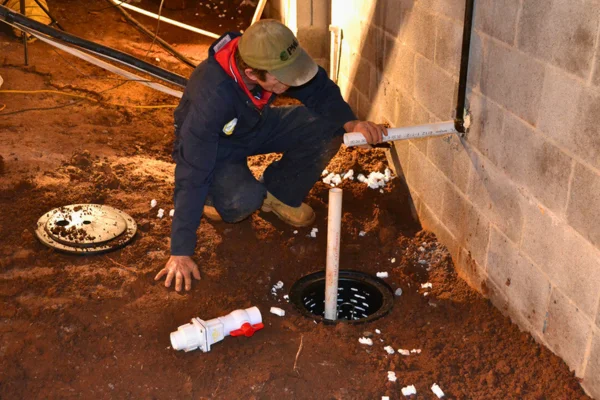Home appliances make daily life convenient, but they can also be a hidden source of water damage. A small leak from a washing machine, dishwasher, or water heater can quickly escalate into costly repairs. By identifying the most dangerous appliances and being aware of the warning signs, you can prevent damage and lower the need for home water damage repair.
Let’s explore the appliances most likely to cause water problems and how to recognize early warning signs.
Common Home Appliances That Can Cause Water Damage
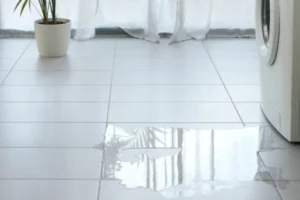
Many everyday appliances rely on water, which means they can also be a source of leaks if neglected. Being aware of how each appliance can affect your home helps you take preventive action and avoid unexpected water damage repair costs.
Washing Machines – Leaks and Overflow Risks
Washing machines are essential for clean clothes, but a washing machine leak can quickly cause significant damage. Over time, hoses can wear out, seals can weaken, and overloading can lead to overflow.
Key points to prevent washing machine water damage:
- Inspect hoses regularly for cracks or bulges.
- Ensure connections are secure.
- Avoid overloading the drum.
- Clean lint filters and drains to maintain proper flow.
- Check door seals for mold or tears.
Dishwashers – Drain and Seal Failures
Dishwashers can leak due to worn door seals, clogged drain hoses, or faulty connections. A dishwasher leak often goes unnoticed until water pools on your kitchen floor, potentially damaging cabinets and flooring.
Tips for monitoring leaks:
- Check the door seal for wear or cracks.
- Inspect and clear the drain hose from clogs or kinks.
- Look for moisture around the base or behind the unit.
Refrigerators with Ice Makers – Hidden Water Lines
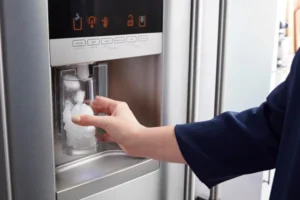
Refrigerators equipped with ice makers or water dispensers carry hidden risks. A refrigerator water leak often starts from the water supply line or connections behind the appliance.
Preventive steps:
- Inspect water lines regularly for leaks or wear.
- Replace old lines with reinforced tubing for added durability.
- Keep the area around the fridge dry to spot leaks early.
- Schedule periodic professional inspections.
Water Heaters – Tank Leaks and Pressure Valve Failures
Heaters are another common source of home water damage repairs. Corrosion and sediment buildup can cause tank leaks, while faulty pressure relief valves may release excess water, creating hazards.
To prevent water heater water damage:
- Check the tank for signs of rust or corrosion.
- Inspect valves for proper function.
- Schedule annual professional maintenance.
Sinks and Garbage Disposals – Plumbing Connections
Sinks and garbage disposals often go overlooked as potential sources of water damage. Leaks can arise from cracked basins, corroded pipes, or deteriorating seals.
Monitoring tips:
- Check under sinks for moisture.
- Inspect drain connections and pipes for corrosion.
- Keep garbage disposals free from clogs.
Signs Your Appliance May Be Leaking
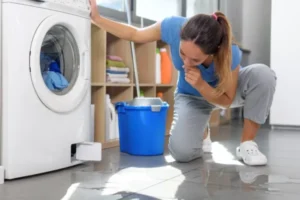
Detecting early signs of appliance leaks can save you time, stress, and unexpected/avoidable costs.
Visible Water Puddles or Stains
As you go about your daily routine, spotting visible water puddles or stains around your appliances can be a clear indication that something’s not right. Watch for:
- Water pooling around the bases.
- Stains on floors or walls.
- Damp spots in unusual areas.
- Increased humidity nearby.
Musty Odors or Mold Growth
Mold and musty smells are common indicators of hidden leaks. Even a small washing machine leak can encourage mold growth, affecting both health and property. Inspect beneath and behind appliances regularly, and act immediately if you detect moisture or mold. Mold remediation services may be necessary to resolve the problem fully.
Unusual Sounds or Performance Issues
Unusual sounds or performance issues from your appliances can signal potential leaks that need immediate attention. Here are some indicators to watch for:
- Hissing or bubbling during cycles.
- Gurgling sounds.
- Inconsistent water flow.
- Excessive vibrations.
Increased Water Bills
A sudden spike in your water bill may indicate a hidden appliance leak. Dishwashers, washing machines, or leaking water heaters can waste large amounts of water before visible signs appear. Monitoring bills alongside visual inspections helps identify issues before they become pricey.
Preventive Measures to Reduce Appliance Water Damage Risk
To prevent water damage at home caused by appliances, you need to take some preventive measures.
Regular Inspection and Maintenance
By taking a proactive approach, you can spot upcoming issues before they escalate. Here are some key maintenance tips to keep in mind:
- Check hoses, connections, and seals for wear.
- Clean lint filters, drains, and appliance interiors.
- Test valves and faucets.
- Schedule annual professional servicing for major appliances.
Installing Water Leak Detectors
Water leak detectors can alert you to leaks before they cause damage. Place them near washing machines, dishwashers, and water heaters. Many models offer smartphone alerts, allowing you to respond promptly even when away from home.
Proper Installation and Professional Servicing
Correct installation and professional maintenance reduce risks significantly. Hire qualified technicians and schedule yearly checks to ensure valves, hoses, and appliances function properly. Replace worn parts immediately to maintain your system integrity.
Quick Action on Minor Leaks
Never ignore even a small drip. Address leaks promptly by tightening connections or replacing faulty hoses. If a repair is beyond your expertise, call a professional immediately. Quick action limits damage and reduces the likelihood of an insurance claim.
What to Do When a Leak Occurs
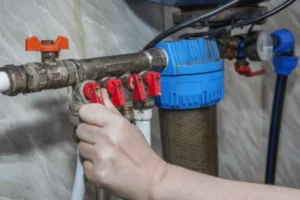
If a leak occurs, act fast to prevent escalation. Do the following actions:
Shut Off Water Supply Immediately
As soon as you notice a leak, locate the main valve or the specific appliance shut-off valve and stop the water flow. Acting quickly limits damage and gives you control over the situation.
Document the Damage for Insurance
Take photos, list damaged items, note dates and times, and keep receipts. Thorough documentation strengthens your water damage insurance claim and ensures proper compensation.
Call a Professional Restoration Company
Even if you’ve done everything right in documenting the damage, calling a professional restoration company is crucial after a leak occurs. A restoration company can:
- Assess damage.
- Extract water efficiently.
- Dry and dehumidify affected areas.
- Prevent mold growth.
- Restore your home to pre-damage condition.
Professional intervention ensures safety and minimizes long-term repair costs.
Long-Term Strategies to Protect Your Home
To safeguard your home from water damage, consider investing in:
Smart Home Appliances and Sensors
These technologies not only enhance convenience but also provide real-time monitoring and alerts. When a leak is detected, smart appliances (like washing machines, leak detectors, and automated valves) can automatically cut off the water and provide early warnings.
Regular Home Water Safety Audits
Inspect all appliances, hoses, and plumbing periodically. Check for wear, corrosion, or leaks, and monitor water bills for unusual spikes. Regular audits allow early detection and mitigation of emergency water damage repairs.
Professional Maintenance Plans
While you can handle many maintenance tasks yourself, enrolling in a professional maintenance plan can provide greater peace and long-term protection for your home. Some benefits include:
- Regular inspections by experts who understand appliances.
- Cost savings from early issue detection and prompt fixes.
- Peace of mind knowing your appliances are properly maintained.
Protect Your Home from Appliance Water Damage- Final Considerations
Worried About Water Damage From Appliances? Contact Our Experts for a Free Home Safety Inspection!
Proactive care, inspections, and timely maintenance greatly reduce the risk of home water damage repair. Acting quickly on leaks, monitoring appliance performance, and using innovative technology or professional services ensures your home remains safe, dry, and functional. Don’t wait for a small leak to turn into a costly disaster.
Frequently Asked Questions
1. How often should I inspect my appliances for leaks?
2. Which appliances are most prone to leaks?
3. Can old appliances be repaired to prevent leaks?
4. What types of insurance cover water damage from appliances?
5. How can I detect hidden leaks in my home?
6. When should I call a professional for home water damage repair?
